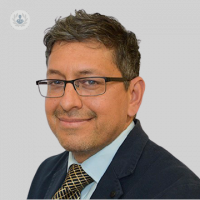Cholecystectomy: everything you need to know before you get your gallbladder removed
Written in association with:Gallbladder removal surgery, or cholecystectomy, is one of the most common surgical procedures in the world. Nevertheless, many people find the prospect of undergoing this surgery daunting and are quite nervous in the run-up to the procedure. In his latest article, leading consultant surgeon Mr Atul Bagul explains this surgery in detail.

Who may need to have a cholecystectomy (gallbladder removal)?
Any patient diagnosed with gallstones, and the gallstones are causing symptoms, will need a cholecystectomy. Gallstones are usually diagnosed by an ultrasound scan, or sometimes by a CT scan.
The gallbladder is usually removed with keyhole surgery. The symptoms caused by gallstones include:
- Pain after a big meal.
- Infection.
- Pancreatitis, or inflammation of the pancreas.
- Obstructive jaundice
What are the benefits of the procedure?
The main benefit of the surgical procedure is the relief of the patient’s symptoms. It also prevents serious, life-threatening complications that can accompany gallstones, such as pancreatitis or obstructive jaundice.

Are there any negative side effects?
Some patients can complain of post-operative pain or discomfort. However, this pain usually settles down with painkillers.
No surgical procedure is associated without any risk. One risk associated with gallbladder removal is a bile leak. This happens in about 4-5% of patients. Another risk is a retained gallstone.
Sometimes we can get an infection, which is treated with antibiotics. Rarely there can be bleeding, damage to the bile ducts, or damage to surrounding structures like the bowel or liver. However, this only happens in about 1 out of every 100 patients.
Diarrhoea is another complication, which tends to settle down with time.
Is the procedure safe?
There is no surgical treatment with zero risks, however, the removal of the gallbladder is considered a low-risk procedure. It is one of the most common surgical procedures in the world.

What is the recovery period like after a cholecystectomy?
Usually, this is a day-case surgical procedure, meaning you come to the hospital and go home the same day. Some patients may stay in a bit longer, for various different reasons. One example is if your surgery is done late in the evening, and it takes time for you to recover and you can go home the next day. It also takes time for the medications and anaesthetic to wear off.
Is it possible to lead a normal and full life after a cholecystectomy?
Yes, the whole aim of surgery is to remove the gallbladder if it is causing problems, and prevent life-threatening complications. You should be back to your normal activities within a few weeks of the surgery.
Mr Atul Bagul is a leading consultant surgeon with more than 25 years of experience. If you are worried about gallstones, you can book an appointment with Mr Bagul via his Top Doctors profile today.


